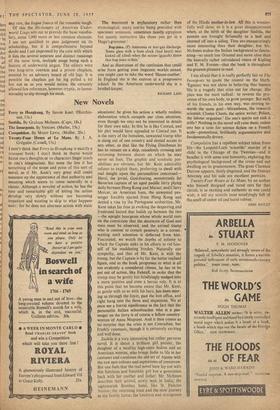New Novels
Grdgoire. (Cassell, 15s.)
I DON'T think that Ferry to Hongkong is exactly a resonant book; I don't think its theme would haunt one's thoughts or its characters linger much in one's imagination. But none the less it has something of the scope and poise of this sort of novel, as if Mr. Kent's very great skill could summon up the appearance of that authority and meaning which seems to come naturally in a classic. Although a novelist of action, he has the rare and remarkable gift of letting the action develop very slowly without our becoming impatient and wanting to skip to what happens next : for he does not alternate action with static
situations; he gives his action a wholly realistic elaboration which compels our close attention, even though we may not be interested in details for their own sake. In this he is like Conrad, and his plot would have appealed to Conrad too. It
is the story of the homeless, unwanted tramp who
is slung out of one country and denied access to any other, so that like the Flying Dutchman he
has to remain on a ship, ceaselessly crossing and recrossing between shores on which he may never set foot. The graphic and symbolic pos- sibilities are obvious, but Mr. Kent admirably refuses to exploit them, preferring to dwell with real insight upon the personalities concerned- Herzl, the jovial, God-fearing, monstrously fat Bavarian captain of an aged paddle ferry plying daily between Hong Kong and Macao; and Clarry Mercer, an American bum, the unwanted pas- senger forcibly ejected from Hong Kong and denied a visa by the Portuguese authorities. Mr. Kent takes his time in evoking the despairing and frustrated hatred that builds up between the two —the upright bourgeois whose whole world rests on the conviction that the decencies of God and man must be observed, and the animal tramp who is content to crouch passively in a corner, waiting until attention is deflected from him. Fascinated, we watch the depths of infamy to which the Captain sinks in his efforts to rid him- self of his maddening burden. Naturally our sympathy, and that of Mr. Kent, is with the tramp, but the Captain is by far the better realised figure, and as the book progresses to what is all too evidently a considered climax, he has to be put out of action, like Falstaff, in order that the tramp may be gently but falsifyingly nudged into a more positive and even a heroic role. It is at this point that we become aware that Mr. Kent, as gentle with us as with his hero, has been steer- ing us through the foyer, past the box office, and right bang into the three and sixpennies. We at once see a horrid significance in the fact that the personable Italian schoolteacher who is a pas- senger on the ferry is of course a fellow country- woman of Anna Magnani. And it then comes as no surprise that the crisis is not C'onradian, but frankly cinematic, though it is extremely exciting and well done.
Sushila is a very interesting but rather perverse novel. It is about a brilliant girl painter, the daughter of a wealthy high-caste Indian and an American woman, who brings India to life in her canvases and combines the old art of Ajanta with the raw new colours and aspirations of tomorrow. But one feels that the real novel here lay not with this fabulous and futuristic girl but a generation back with her mother and father. Mr. McInnes describes their arrival, newly wed, in India; the nightmarish Bombay hotel, like St. Pancras Station; the swarming train and the slow journey to the family home; the kindness and strangeness of the Hindu mother-in-law. AII this is wonder- fully well done, so it is a great disappointment when, at the birth of the daughter Sushila, the parents are brought fictionally to a halt and shunted off into a siding. They are exasperatingly more interesting than their daughter, but Mr. McInnes makes the Indian background so fascin- ating—so much less Oriental and more alive than the basically rather intimidated vision of Kipling and E. M. Forster—that the book is throughout the greatest pleasure to read.
I am afraid that it is really perfectly fair to The Insurgents to quote the resume on the blurb. 'Egmont was not alone in believing that human life is a tragedy that cries out for change. His plan was the most radical: to reverse the pro- cesses of his own body, to grow younger. But each of his friends, in his own way, was striving to- wards the same goal—Mirambeau, the research scientist; Closter Cloots, the satiric writer; Pelion, the labour organiser.' Do one's spirits not sink a trifle? Nothing in the novel will raise them, unless one has a taste for science fiction on a French scale—pretentious, brilliantly argumentative and fundamentally dreary.
Compulsion has a repellent subject taken from life—the Leopold-Loeb 'scientific' murder of a child in the Chicago of the Twenties—and it handles it with sense and humanity, exploring the psychological background of the crime and not dwelling on its gruesomeness. The great Clarence Darrow appears, thinly disguised, and the District Attorney and his aide are excellent portraits.
Twenty-Four Hours at Le Mans, by an author who himself designed and raced cars for that circuit, is as exciting and authentic as one could wish; it left my nostrils most satisfyingly full of the smell of castor oil and burnt rubber.
JOHN BAYLEY


































 Previous page
Previous page